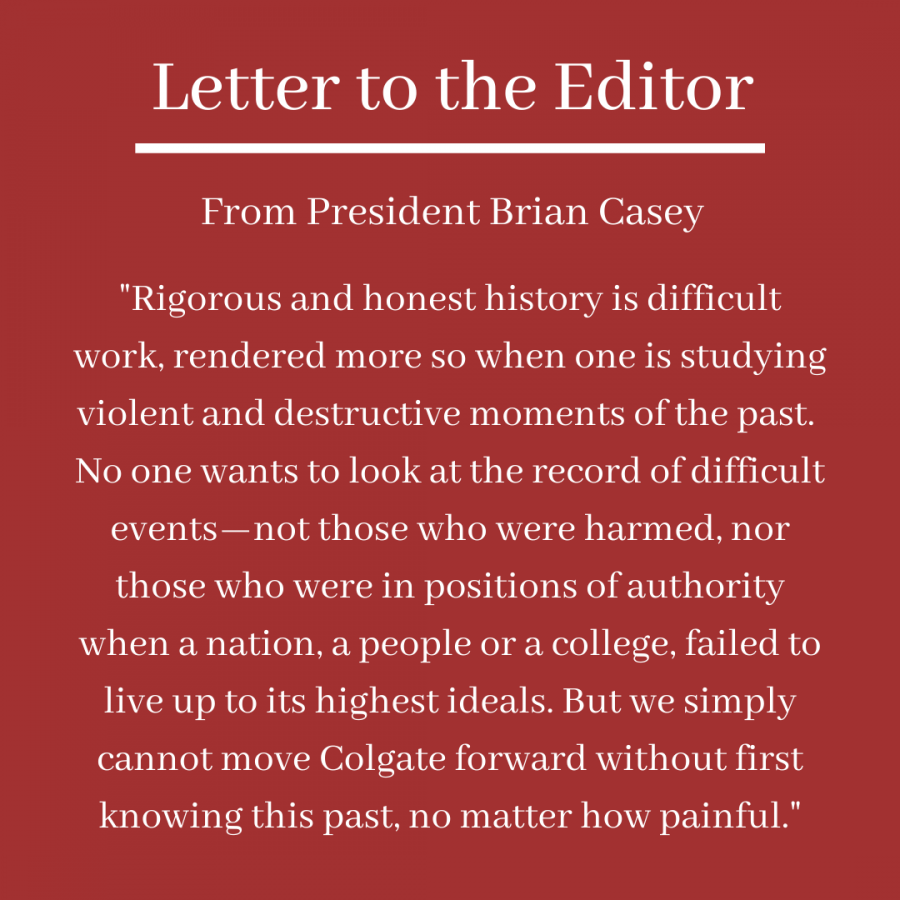Letter to the Editor: President Responds to Op-Ed on Colgate’s Cycle of Racism
To the Maroon-News editors,
I want to start out this message with a note of appreciation and gratitude to the Maroon-News for the work of its editors and staff writers in putting together a thoughtful and comprehensive editorial about the history of racism and racist incidents on the Colgate campus, published on June 9, 2020.
I write now to speak to the main points of the editorial—that this campus, like many others, has struggled with the effects of racism and continues to do so. We must acknowledge this struggle and reaffirm a commitment to fighting ignorance and hatred. Colgate’s fundamental mission, as an academic institution dedicated to teaching and learning at the highest levels, is ultimately unachievable in the face of persistent ignorance and hatred. Racism—which causes one to be incapable of seeing the value of all members of a community and their contributions to its work and which prevents a college or university from both attracting and fully supporting all those who should be part of an academic community—fundamentally limits the University. It undercuts our work, diminishes the reach of our faculty, impedes the full flourishing of our students, exhausts our staff, and constrains the reach and scope of our thoughts. It is anathema to the true work of the University, and harmful to its members.
Reading through the events highlighted in the editorial was difficult for me. But I am certain it is far more so for those Colgate students, faculty, staff members and alumni who have experienced acts of racism firsthand.
It is also true—as the editorial points out—that memory on a campus is short. With more than 700 students graduating every year, the student body annually loses much of what was learned, or even experienced first-hand, through these difficult moments. But it shouldn’t be incumbent upon students, nor the Maroon-News, to bear the burden of accumulating, recording and conveying this history. Nor should a student newspaper bear the burden of the obligations of history, namely the duty of ensuring that difficult events are neither forgotten nor ignored.
It is a failure of a University not to know its own past. It is a greater failure not to learn from it. But it is also a failure to assign the work of remembering the past to students and to a small group of dedicated alumni of color who have passed down stories regarding events on this campus for years.
I am an historian by training. And the study of the past remains one of my great loves. But despite my love of the discipline of history, I have never thought of it as an easy pursuit. Rigorous and honest history is difficult work, rendered more so when one is studying violent and destructive moments of the past. No one wants to look at the record of difficult events—not those who were harmed, nor those who were in positions of authority when a nation, a people or a college, failed to live up to its highest ideals. But we simply cannot move Colgate forward without first knowing this past, no matter how painful.
It is in this spirit that today I am announcing the creation of The Colgate History Project. This critical effort will pull together students, faculty, staff, alumni, and scholars from around the nation to develop a comprehensive historical perspective of race and inclusion at Colgate. Let’s look at those moments when we opened the circle of our endeavors, and those moments when they were closed down. We must examine our achievements, and our failures. We must know the stories of those who came before us, and the events that marked their time on this campus.
I have just begun conversations about this proposed project with a few faculty members. I will work in the weeks ahead to shape this project and to include as many who wish to engage in this work. This project will need not just our historians, but our philosophers and our political scientists, our sociologists and anthropologists. It will need a faculty. It will require us to gather the histories of our alumni, and it will require us to go to the archives. It will call on us to think critically and clearly. It will, in short, require us to draw on the very mission of this University. I invite your thoughts on this new project, and invite your participation.
As most of you know, and as was reported in the paper’s editorial, when I arrived at Colgate, I asked for a review of Colgate’s efforts in diversity, equity and inclusion. As the Maroon-News noted, we now have this report and know of its findings. And eighteen months ago, we established a Diversity Equity and Inclusion Taskforce to develop a broad series of initiatives and efforts to move forward the important work of combating racism and to ensure our campus is a welcoming place for students, faculty and staff of color. This resulted in Colgate’s first Diversity, Equity and Inclusion Plan, the work of over 70 members of the faculty and staff—which was published this past November. A status report of this work will be distributed this summer.
Among other steps, the Diversity, Equity and Inclusion Plan calls for Colgate to record when acts of bias occur and to document the University response. This will aid us in maintaining a more complete record of events on the campus and the responses and actions to such acts. This plan, thus, could also be thought of as part of The Colgate History Project.
History is a gathering of data and stories; it is also an endeavor to know the past. It is also the foundation for any university that seeks to shape the future. You need to know where you have been before you can get to where you need to go.
I will be meeting with the Board of Trustees this week to discuss the events of recent weeks in the nation, and to talk about this and other projects Colgate should take up. I look forward to this work, and to discussing the specific steps the institution must take to combat racism, and live up to its highest academic and ethical ideals.
In the meantime, please take care of yourselves and each other this summer. And, again, thank you to the staff of the Maroon-News for your valuable work.
Brian W. Casey
President
Editorial Note: This letter refers to a Commentary article published on June 9 titled “Incident, Protest, Email, Repeat: The Exhausting Cycle of Racism at Colgate” which can be found at this link.
Emily Rahhal is a senior from Los Angeles, California double concentrating in Middle Eastern and Islamic Studies and Religion. She has previously worked...











Juan Dela rosa • Jun 17, 2020 at 12:38 am
President Casey
I would love to be part of the team, I have several ideas on how we can start the healing process.